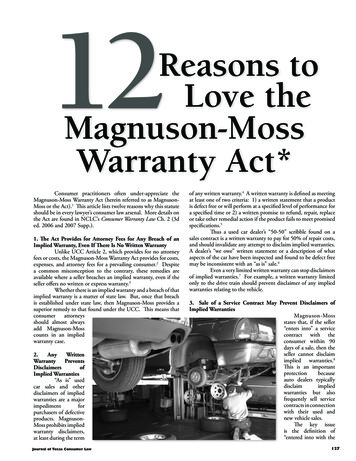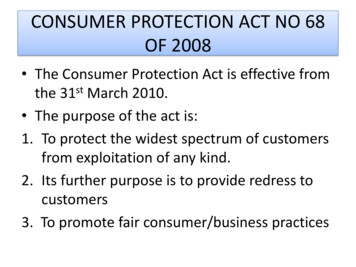
Transcription
CONSUMER PROTECTION ACT NO 68OF 2008 The Consumer Protection Act is effective fromthe 31st March 2010. The purpose of the act is:1. To protect the widest spectrum of customersfrom exploitation of any kind.2. Its further purpose is to provide redress tocustomers3. To promote fair consumer/business practices
CONSUMER PROTECTION ACT The Consumer Protection Act haseffectively repealed other relatedlegislation, namely the MerchandiseMarks Act; Business Names Act;Price Control Act; Sales and ServiceMatters Act; Trade Practices Act, andthe Consumer Affairs Act.
CONSUMER PROTECTION ACT The Act governs the relationship between thesupplier and the consumer in the way of theordinary conduct of business between andamoung parties, the promotion of goods(including purchase & sale of goods), and generalaspects of goods and services. It does not govern the state in its capacity as aconsumer; or employment contracts, collectiveagreements and collective bargaining agreementsunder the LRA
Consumer Protection Act Some Services that the Act includes are:1. Any banking or similar business; long termand short term insurance; education services;information services; consultancy services;transportation of goods and people;accommodation; entertainment; electroniccommunication, infrastructure; use andrental of property**The above is not an exhaustive list
CONSUMER PROTECTION ACT The consumer is defined as any person towhom goods and services are marketed; or,any person that is party to a transaction with asupplier in the ordinary course of business; or,the user of goods or beneficiary of services;or, franchisees
CONSUMER PROTECTION ACT YOUR RIGHTS AS A CONSUMER ARE:To equality; disclosure; information; to choosefreely; fairness and honesty (honest dealing);privacy; fair value; good quality; safety;accountability of the supplier you engage with
CONSUMER PROTECTION ACT Your right to equality properly defined in thecontext of the Act means that suppliers shouldnot market their goods and services unfairlyso as to discriminate or differentiate betweenclasses and categories of consumers. This right excludes services that are designedto cater for minors, the aged, in specialcircumstances a service may be designed forspecific genders.
CONSUMER PROTECTION ACT Your right to privacy properly defined in theAct means that you may refuse directmarketing by blocking unwanted calls to yourprivate phone from the open direct market.You may also request certain suppliers todesist from sending you brochures and othermarketing tools at your private address if youfind that it is a nuisance to you
CONSUMER PROTECTION ACT You right to choose properly defined in thecontext of the Act means that you are entitledto notice periods and cooling off periods irodirect marketing. It also means that youshould be entitled to full refunds upon returnof goods within a specified time period.** You must be informed of the above when youpurchase your goods & services!
CONSUMER PROTECTION ACT Your right to disclosure & information properlydefined in the context of the Act means thatall documents or visual aids used in the courseof marketing must be within prescribedlimitations in a language you can understand& appreciate even if you are not accustomedto a vibrant consumer market.** You must understand the content of theadvert/document as effortlessly as possible!!
CONSUMER PROTECTION ACT Your right to fair and reasonable terms as definedin the context of the Act means that you areentitled to a level of fairness, lawfulness, andreduced liability as relates to the terms of theagreements you enter into.** This does not mean that you should not readagreements fully before you sign them; nor doesit mean that you would be excused if you failed toask relevant questions before you sign!!
CONSUMER PROTECTION ACT Your right to fair marketing defined in the Actmeans that you should not be deceived throughthe method and style of marketing, either by asupplier making misleading or incorrect orambiguous comments about products; OR BYbeing baited or negative marketing (anagreement will exist if you do not reply with a NOto an sms for example).** If you are misled in this way it may amount tofraudulent conduct on the part of a supplier!!
CONSUMER PROTECTION ACT The University has the same obligations asother suppliers ito the Act. What this meansis that the University cannot advertise usingincorrect or inaccurate and exaggeratedrepresentations including offers ofemployment as part of its advertisingcampaign to increase its recruitment ofstudents!!
CONSUMER PROTECTION ACT Your right to fair and honest dealing asdefined in the Act means that you should notbe subject to coercion, pressure tactics,harassment, false, deceptive, and other formsof negative conduct by suppliers
CONSUMER PROTECTION ACT YOU HAVE THE RIGHT TO DEMAND SAFE,QUALITY, FREE OF RISK OR HARM -GOODSAND SERVICES WITH UNDERTAKINGS OFGUARANTEES AND WARRANTIES ASASSURANCE OF QUALITY, SAFETY, ANDMINIMAL RISK IN ASSOCIATION WITH YOURGOODS/SERVICES.* You have the right to refunds, remedy ofdefects or replacement of goods!!
CONSUMER PROTECTION ACT PRODUCT LIABILITY:Product liability is a legal mechanism whereby wetrace the liability arising from the product to thetrue accountable source. It could be themanufacturer; the importer, the distributor, orthe retailer, or all of the above.** You may base your claim for financial loss onterms of product liability and hold themanufacturer, distributor, retailer or allaccountable for your loss!!
CONSUMER PROTECTION ACT RECOURSE: Where you have a claim arising fromthe Consumer Protection Act, you may: Refer the matter to the consumer tribunal Refer the matter to the relevant ombudsmanhaving jurisdiction over the consumer Refer the matter to the industry ombudsman Refer the matter to the Consumer Court** You can ONLY approach the Consumer Court ifALL other options have been exhausted!!
CONSUMER PROTECTION ACT NO 68 OF 2008 The Consumer Protection Act is effective from the 31st March 2010. The purpose of the act is: 1. To protect the widest spectrum of customers from exploitation of any kind. 2. Its further purpose is to provide redress to customers 3. To promote fair consumer/business practices
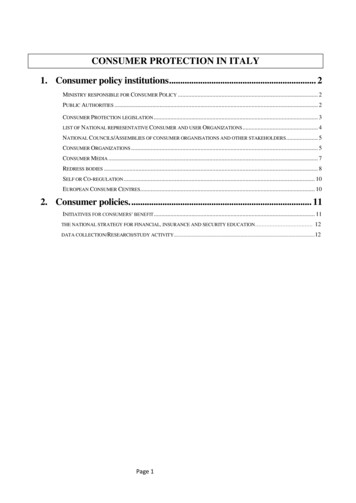
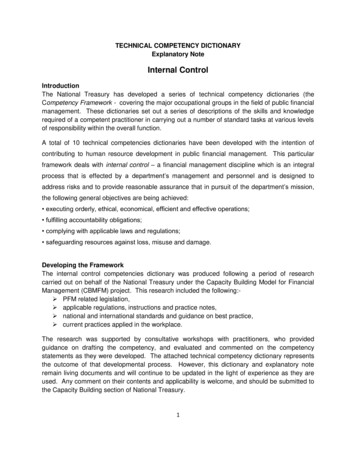
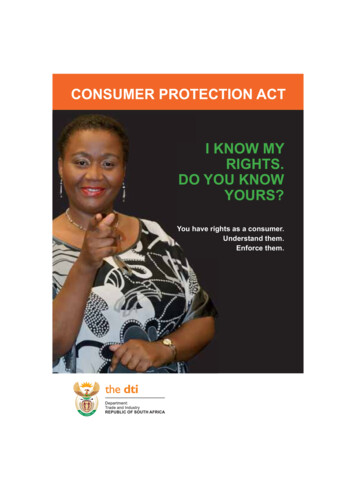
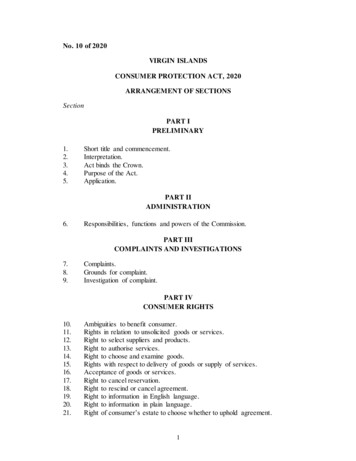
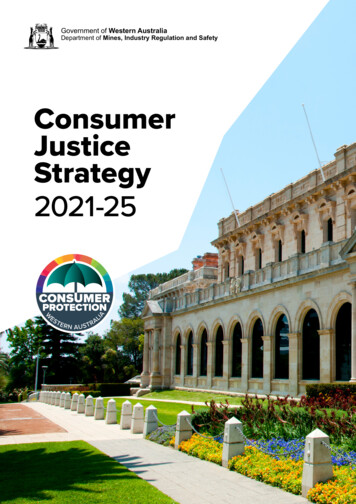

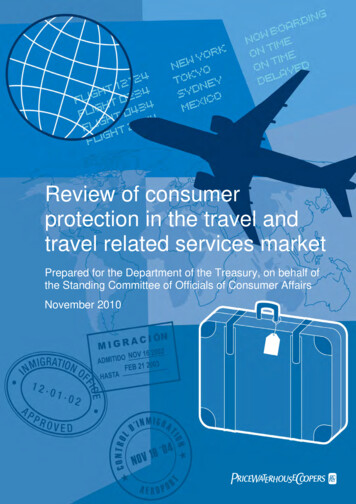
![Chapter 11. Consumer Protection. [Note] - Montgomery County, Maryland](/img/40/chap11.jpg)


